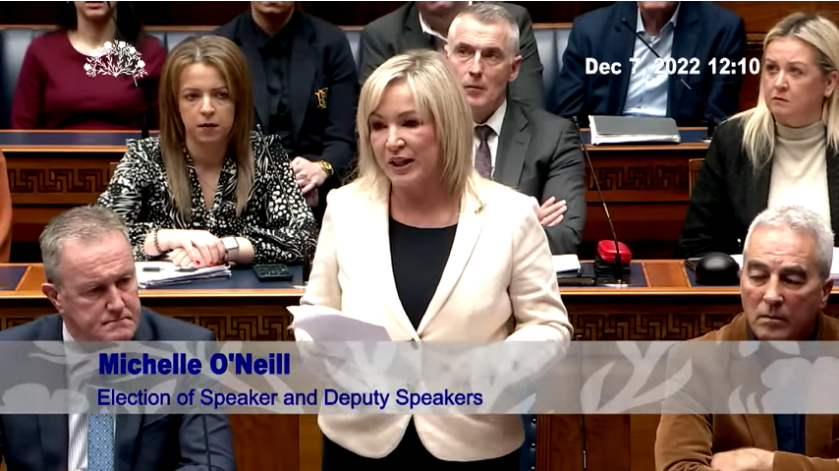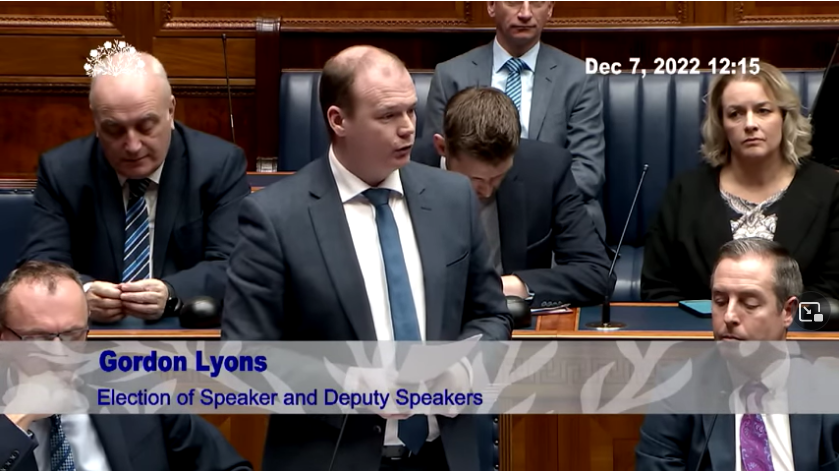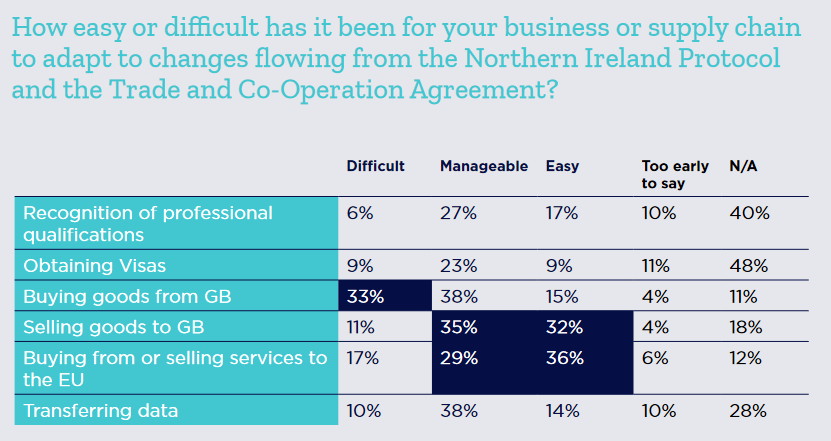Brexit & Beyond Newsletter
13 December 2022
 Welcome to the 13 December 2022 Brexit & Beyond newsletter
Welcome to the 13 December 2022 Brexit & Beyond newsletter
The NI Assembly was recalled last Wednesday in an attempt to elect a Speaker. Reportedly, the Prime Minister has stalled the NI Protocol Bill, amid hope that an EU-UK agreement on the Protocol can be reached in coming months. There are concerns about the supply of veterinary medicines to NI - the grace period is due to end on 31 December. The NI Chamber of Commerce has published the findings of its trade survey.
NI Assembly recalled
MLAs returned to the Assembly Chamber on Wednesday 7 December, following a recall petition from Sinn Féin, backed by the Alliance party and SDLP, to debate the cost of living crisis and the £600 energy support payment, which has not been received by households in Northern Ireland. The first item of business was to elect a Speaker. Neither nomination received cross-community consent and therefore no further business could take place.

Michelle O’Neill of Sinn Féin speaking in the chamber | Source: NI Assembly TV
Michelle O’Neill (Sinn Féin) welcomed improved contacts between the UK and EU, but appealed for negotiations to be intensified. She said, “We do not have months to ponder…Everyone knows that, by any objective measure, the protocol is working and is protecting our economy from some of the worst effects of Brexit.” She said the Protocol issues “will not be resolved in this Chamber”. Gordon Lyons (DUP) said the Assembly recall had “one useful benefit: it provides us once more with the opportunity to say clearly to the Government and the European Union that the issue must be resolved.” He said, “What will unlock devolution is getting the protocol sorted, restoring Northern Ireland's place in the UK internal market and removing the democratic deficit…We say to the UK and the EU, ‘The ball is in your court. The clock is ticking. Get on with it’.”

The DUP’s Gordon Lyons speaking during the debate | Source: NI Assembly TV
Kellie Armstrong (Alliance) focused her remarks on the implications of not electing a Speaker, saying, “From what I have heard today and as a result of the use of cross-community voting in this place, I do not expect the DUP to end its boycott, and I expect every household in Northern Ireland to face a cold winter without the same level of help that is being provided to others across the UK.” Doug Beattie (UUP) said, “The protocol was a bad deal, and it was a bad deal that was facilitated by the DUP…However, handing all the power to those who brought in the protocol is absolutely crazy.” He added, “Anyone who tells you that the collapse of the Executive brought anybody to the negotiating table is telling you lies. Global forces brought them back to the negotiating table. The cost of the protocol brought them back to the negotiating table, not this.”
Jim Allister (TUV) referred to the Supreme Court case on the Protocol saying, “A Protocol that requires unionists to operate an Assembly and to conduct themselves as Ministers on the basis that GB is a foreign country is not going to operate with the consent of unionists.” Gerry Carroll (PBP) said, “Just as everyone knows that the DUP will not vote for a Speaker, they know that the DUP's outrage about the protocol is manufactured.” Daniel McCrossan (SDLP) said, “The DUP knows, as does anybody in Northern Ireland with ears and eyes, that it has no influence over the negotiations between the EU and the British Government. Zero.” Alex Easton (Independent) highlighted issues with the Protocol and stated, “Much as I want to help the people of Northern Ireland…the reality is that, until there is political maturity from the rest of us in here and until Westminster and the EU stop playing games, we will get nowhere.”
The latest on the Protocol
A report from the Sunday Times suggests Prime Minister Rishi Sunak has paused the passage of the Northern Ireland Protocol Bill until the new year. The Bill would allow the UK to unilaterally disapply core parts of the Protocol relating to trade in goods, subsidy control, the role of the Court of Justice of the EU, plus allow changes to VAT. According to senior government officials this move is to avoid disrupting talks as the UK believes the EU is prepared to give ground. The paper reports conversations with UK and EU figures who think a deal could be reached by February. A senior government official said: “To give room to the negotiations we are not asking for the whips to bring it [the Bill] back to the Lords now. We want to give negotiations the best chance.” At Prime Minister’s Questions on Wednesday, Sunak told the Commons, “I want to see the issues with the protocol resolved as quickly as possible. I believe that if people enter into the talks that we are having in a spirit of good will and pragmatism, we can indeed find a way through.” On Friday, DUP leader Sir Jeffrey Donaldson wrote to the PM, saying progress on the NI Protocol Bill is “tediously slow” and “if the Protocol and its trade suffocating measures are not replaced with new arrangements that both unionists and nationalists can support, then [the 25th anniversary of the Belfast/Good Friday Agreement] will come and go without a functioning government in Stormont.”
UK-German relations
German Foreign Minister Annalena Baerbock travelled to the Ireland last week. Snow and ice prevented her from travelling to London to meet UK Foreign Minister James Cleverly. Addressing a UK-German conference via video message, Minister Baerbock encouraged the UK Government “to take up the very constructive EU proposals that are on the table – in the interest of the people in Ireland, in the UK, and all of us in Europe.” In an interview with German newspaper die Welt Minister Cleverly called Germany’s commitment to the Protocol on Ireland/Northern Ireland “an avatar…I think often what people say they want and what people actually want are subtly different”.
Trade Survey
The NI Chamber of Commerce and Industry has published the findings of a recent survey carried out with Invest NI. It finds that 54% of its members believe the Protocol on Ireland/Northern Ireland is supporting business growth, while 29% do not. 33% of businesses find difficulties in buying goods from GB. Almost 50% of respondents say their business views about trade deals are not taken into account by the UK Government. Ann McGregor, Chief Executive of NI Chamber said, “The view of the majority of the respondents is that the Protocol is a vehicle for growth, while there are real issues to be resolved for a significant minority of firms...Agreed solutions must be delivered at pace. If we get all of this right, there is a real opportunity for growth in 2023.”

Businesses’ adaptation to new trading conditions | Source: NI Chamber and Invest NI Trade survey
Tracking divergence
The Lords Sub-Committee on the Protocol has written to the Foreign Secretary, contending that it is “essential that the Government keeps a single published log of all cases of regulatory divergence arising from UK and EU legislation since the Protocol came into force.” Since April 2021, the Committee has written to the Government on over 50 EU legislative proposals applying under the Protocol, as well as domestic legislation. It states, “As both the EU and the UK bring forward further legislation, the practical consequences in terms of regulatory divergence will become ever more complex.”
Data sharing
The Guardian reports that a new HM Revenue and Customs database shows at least 85% of goods arriving in NI from GB stay in NI. The EU has been testing this database since 7 November, which provides it with real-time customs and commercial data on the movement of goods from GB to NI. The paper reports, “it is understood that a significant proportion of the goods classified as at risk of crossing the border remained in Northern Ireland, but were classified as such because the accompanying paperwork did not meet requirements.” European Commission Vice-President Maroš Šefčovič has previously said that the EU’s offer of “minimum checks [GB-NI], done in an invisible manner” could be implemented if the UK gives EU officials real-time data on trade movements.
Supply of veterinary medicines to NI
Full application of EU rules on veterinary medicines are set to apply in Northern Ireland under the Protocol when the grace period ends on 31 December. Concerns have been raised that this could mean an estimated 51% of veterinary medicines are no longer available in NI. The Commons European Scrutiny Committee has received a response from a UK Government Minister on this matter. The Committee has highlighted the “small and fragmented nature of the veterinary medicines market, leaving Northern Ireland highly vulnerable to a significant reduction in the availability of veterinary medicines, with consequent implications for animal health and welfare.”
Minister for Biosecurity, Marine and Rural Affairs Lord Benyon states that the Government is continuing to press the European Commission on the issue and is seeking a long-term solution to safeguard supply to NI. The Minister adds, “It remains our preference to resolve the issues facing veterinary medicines through talks. The Foreign Secretary and Vice President Maroš Šefčovič are in regular contact and have reiterated their shared commitment to exploring potential solutions on this issue.” He reiterated the Government’s position on using unilateral legal action to address the matter: “The Northern Ireland Protocol Bill also aims to ensure that there are no barriers in domestic law that prevent medicines, for either human or veterinary use, from being supplied to Northern Ireland.” The Commons Committee has responded in turn, writing that it is “alarming that such uncertainty hangs over the availability of veterinary medicines” in Northern Ireland. It suggests at least a short-term solution should be negotiated before the 31 December deadline.
Shared Prosperity Fund
The UK has approved local spending plans for the UK Shared Prosperity Fund (UKSPF) which will replace EU structural funds. Councils in England, Scotland and Wales have devised their plans, while for Northern Ireland, the Department for Levelling Up, Housing and Communities is managing the fund. The Government published the UK Shared Prosperity Fund Investment Plan for Northern Ireland, which set outs how £126,854,145 of new funding will be delivered. The Government says under these spending plans “England, Scotland, Wales and Northern Ireland are all receiving at least as much as they did before, while also being free from bureaucratic EU processes and having greater say in how the money is used.”
Ministers in Northern Ireland, Wales, and Scotland previously issued a joint statement calling for the input of devolved governments into the development of the fund, saying, “Denying us any meaningful input harms the effectiveness of these funds…With decisions being made entirely by the UK Government, this falls far short of commitments made during the EU referendum for all these powers to be fully devolved after EU exit.” In October, then Finance Minister Conor Murphy stated that the Shared Prosperity Fund “raises significant concerns; it has not been subjected to screening under our equalities legislation, it will operate directly from Whitehall bypassing Executive Departments, it will deliver too little money, it risks duplication of provision and it lacks alignment to our local priorities.”
Other news
- There are reports that US President Joe Biden is to soon name a special envoy for Northern Ireland. In an interview with the BBC, former Irish ambassador to the US Dan Mulhall said, "It's very likely they will move sooner rather than later, we're now at the mid-point of the president's term, it would seem to me a good time to do something like this."
- The Senedd Legislation, Justice and Constitution Committee will consider a report on the EU-UK Parliamentary Partnership Assembly (PPA). The PPA is a forum for the UK Parliament and the European Parliament to exchange views on the UK-EU Trade and Cooperation Agreement (TCA) [Read more on the TCA and PPA]. The report makes recommendations on the participation of the devolved legislatures in meetings of the PPA.
- The Political Quarterly has published a special collection examining post-Brexit issues, focusing on Northern Ireland and the future of the intergovernmental bodies established by the Good Friday Agreement.



